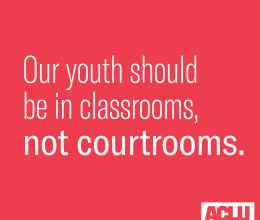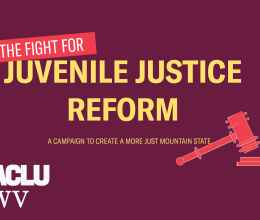
The ACLU of West Virginia is thrilled to announce that the members of the Our Children, Our Future Campaign have voted to make fixing West Virginia’s juvenile justice one of the Campaign’s top 5 issues in its 2015 legislative platform. Thank you to everyone who voted for this issue. We are excited to partner with the Campaign to work for much-needed changes of the state’s juvenile justice policies– especially with regard to our truancy laws.Every year, thousands of West Virginia students are caught up in the juvenile justice system for missing more than 5 days of school. In the last decade, West Virginia has seen a 124 percent increase in the number of children brought to court for a status offense – an offense that violates law only because of the offender’s status as a minor. In many West Virginia counties, status offenses (mostly for truancy) make up at least half of all juvenile cases referred to court, and in some counties, status offenses account for over 90 percent of all juvenile cases.
What is driving the huge increase in the number of children entering West Virginia’s juvenile justice system? The answer lies in the way that the state defines truancy. In 2010, West Virginia enacted a law revising the definition of truancy from 10 unexcused absences to five unexcused absences. Under this new definition,nearly one in three students in West Virginia is truant from school. This new law allows schools to refer children to court after 5 unexcused absences and also allows judges to fine or jail parents who permit their children to miss 5 days of school.
In Kanawha County, one mother unsuccessfully appealed to the West Virginia Supreme Court after she was fined and put on probation because her son had 5 unexcused absences from school. In another case, a school suspended a 14-year-old student for 6 days and then counted those suspension days as “unexcused” absences and also charged her with truancy in juvenile court. The judge ruled that the student was a habitual truant and sentenced to her to probation until she graduates from high school. She also lost her appeal to West Virginia Supreme Court.
As the number of truancy cases in West Virginia has increased, judges have removed a shocking number of children from their homes and placed them in private, for-profit juvenile facilities. From 2002 to 2012, there has been a staggering 255 percent increase in the number of children that judges have sentenced to private facilities for status offenses. Young people spend an average of 15 months in a private facility– costing taxpayers nearly $135,000 per placement. West Virginia spends an estimated $20 million a year on contracts with private facilities to confine youth for status offenses and other low-level offenses.
Rather than spending millions to lock up children in juvenile facilities, the ACLU of West Virginia believes that we should invest in school-based and community-based programs to keep kids in school and to help them become productive adults. That’s why one of our top priorities, now alongside the Our Children Our Future Campaign, is to reform the state’s truancy law to divert more truancy cases from court. Our goal is to amend the current truancy law back to what it was before 2010, in which a student can have up to ten unexcused absences before triggering a referral. In addition, we propose requiring that schools must employ a range of school-based and community interventions to improve school attendance before referring a student to juvenile court for truancy.



